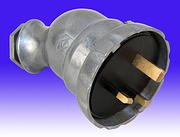Can someone point me in the direction of regs or good guidance relating to outdoor use of a 16a commando type socket vs 13a standard outdoor domestic socket in an outdoor industrial setting. We have an electrician who is arguing that because of rcd protection the 16a blue sockets are overkill. My view is the 13a plugs/sockets are dangerous in the wet - where the socket has little ip rating once the cover is opened. I’m struggling to find good guidance that supports my arguments.
